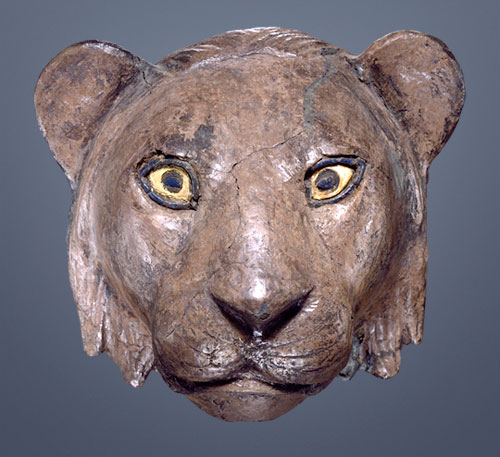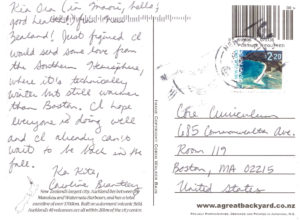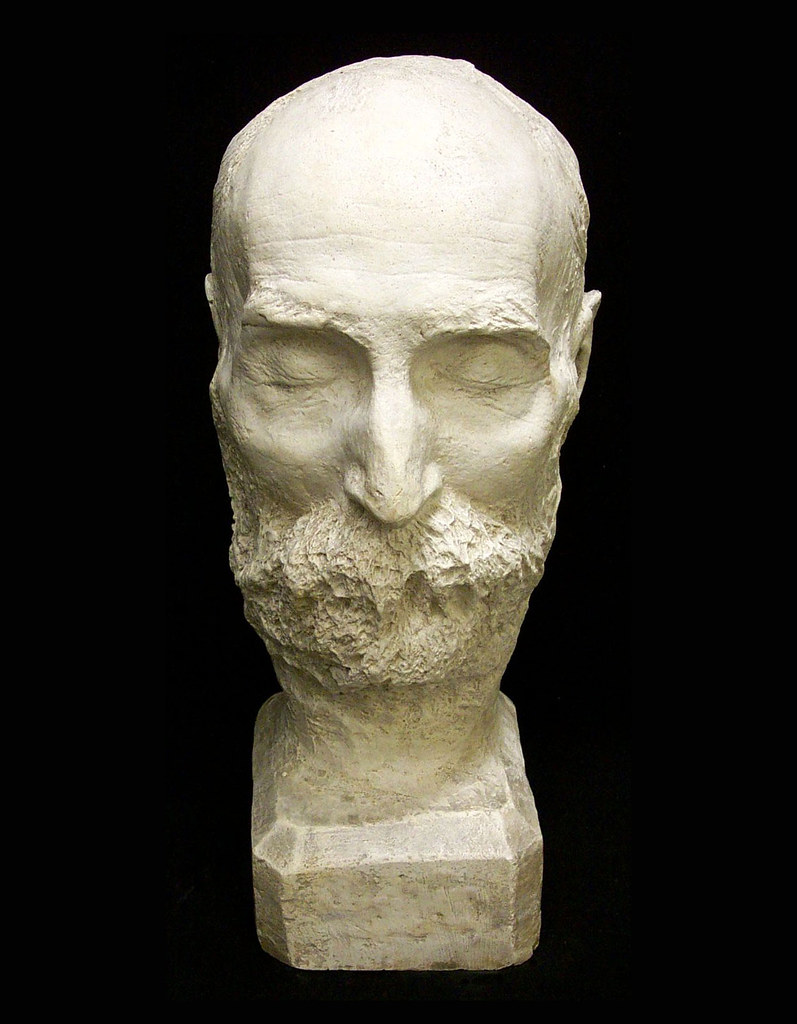July 29, 2017 at 9:04 pm
Oh hello, scholars. This week we take a look at some dead people heads, share some relationship advice, and offer an Instagram account to spice up your feed. Read on!
- Over at Stanford University, celebrations of the 200-year anniversary of Jane Austen’s death continue as a professor and two doctoral students take a look at “one of the biggest literary figures in English,” focusing on her popularity, her place in the literary canon, and her style of prose.
- The Laurence Hutton Collection, located at Firestone Library at Princeton University, contains the death masks of iconic figures like Walt Whitman and Isaac Newton as well as a cast of Goethe’s right (write) hand. This funerary practice was especially popular during the 19th and early 20th centuries, during which celebrity cults and physiognomy saw their rise in American and European culture.
- Foolproof way to force someone to love you: Co-star with them in a performance of A Midsummer Night’s Dream. So say the four starring actors of Shakespeare in the Park’s production of the Shakespearean play, which runs from July 11 to August 13 at the Delacorte Theater in Central Park (for free!). As the actors discuss the chemistry that they “make” if it does not exist naturally, New York Times contributor Alexis Soloski notes “how strange and funny it is that actors’ bodies have to substitute for the bodies of their characters…”
- Fun fact: Emily Dickinson, in addition to her love of poetry, had a passion for botany, visible in her herbarium in which 424 flowers had been carefully arranged by the poet’s hand. Today, the fragile book is held/guarded by Harvard University’s Houghton Library.
- Similar to the Twitter account Tabloid Art History (@TabloidArtHist), which we covered in an earlier Weekly Round-Up, Instagram account @youngthugaspaintings compares hip hop artist Young Thug to such works in the art historical canon as Sandro Botticelli’s The Birth of Venus and Rembrandt van Rijn’s Nicolas Berghem, among others.
That’s all for this week! Don’t forget to check back next weekend for moooooreneeeews.
By cdossett
|
Posted in Friday Fun, In the News
|
Tagged weekly links
|
July 22, 2017 at 8:00 pm
Scholars? Is that you? Sorry, we can't see so well in this blinding sun that has been so persistent this week. Not that we're complaining (actually, we are; we are book-dwellers who screech when exposed to the light of the sun). Anyway, here are the weekly links.
- Shakespeare on the Common takes place on the Boston Common through August 6. This year's performance (which is free to attend!) is Romeo and Juliet, put on by the Commonwealth Shakespeare Company.
- Did you know that John Milton's Paradise Lost was once translated onto toilet paper by Yugoslav communist politician Milovan Djilas during his nine-year imprisonment? This act as well as a number of attempts to censor the work around the world point to the little-known political side toParadise Lost.
- Michelangelo vs. Raphael: A Renaissance artistic rivalry for the ages. Seems Michelangelo was more than a little peeved at the youthful upstart. Raphael, meanwhile, responded in the only way artists know how.

A moody Michelangelo, by Raphael in his work The School of Athens. (via Artnet)
Have you had your fill of weekly knowledge? Come back next weekend for another dose of Core-related insights.
By cdossett
|
Posted in Friday Fun, In the News
|
Tagged weekly links
|
July 16, 2017 at 3:23 pm
Hellooooo Corelings! This week we look at memes, some sweet maps of Hell, and the Core Journal, again, because every work in there is worth your time (the author is definitely not saying that because she is a frequent contributor).
- Fun fact: Did you know the Epic of Gilgamesh, the Tao Te Ching, and works of Shakespeare like Hamlet and Much Ado About Nothing have been translated into Klingon, a fictional language from Star Trek? Here is another addition to the list: a translation of William Blake's poem "The Sick Rose" by Core scholar Ann Marie Dyer for the fifteenth issue of the Core Journal.
- Memes! About Jane Austen novels! Who would have thought? Are they clever or cringeworthy? You be the judge.
- Noah's ark is real and it's located in Williamstown, Kentucky. No word on the exactitude of the dimensions, which have been converted from cubits to feet, but it certainly is gigantic. And while the group behind the ark replica believes in Young Earth creationism, the author of this blog post will withhold her opinions so as to foster good faith with the owners of the ark. You know, for when the seas rise as a result of climate change.
- Threats of assassination! Kidnapping! Imprisonment! Mayorship! Philippe Desan details these misadventures AND MORE in his recently published book on Michel de Montaigne's life, entitled simply Montaigne: A Life. Unfortunately, this description is a lot more exciting than Desan's work, complains Robert Minto in the Los Angeles Review of Books--it is, apparently, tedious and borderline unreadable.
- Infernal cartography,the new craze that's sweeping the nation--that is, if you're living during the Renaissance. Think of it as extremely involved fan art of Dante'sInferno that included careful mathematical calculations that Galileo himself felt compelled to confirm.
That's all for today. Until next week!
By cdossett
|
Posted in Friday Fun, In the News
|
Tagged weekly links
|
July 8, 2017 at 6:10 pm
Greetings Corelings old and new, just born and one foot in the grave. Even those Core animals, of which there are many. Gather 'round for this week's installment of news and articles of interest!
- On this day: Artemesia Gentileschi was born today, July 8, in 1593. Read about her life and art in a piece by Core scholar Caroline Cubbage entitled "Appreciating Artemisia," included in this year's Core Journal.
- Classicist Sarah Ruden translates Augustine's Confessions from the original Latin in a way that separates the text from the Doctor of the Church's religion. Writer Elizabeth Bruenig weighs the author's word choices against past translations and finds Ruden's Augustine to be "a dreamer, an artist, [and] a poet" rather than the saint molded by later forms of Christianity.
- This week in What Is Even Happening Anymore: You may have read about recent shenanigans involving Hobby Lobby and 5,500+ artifacts "acquired" from Iraq. In short, mistakes were made.
- Imagine Chekhov, but with a lot more puppets. Suitcase and the Lapdog is an adaptation of the play The Yalta Game, which in turn is an adaptation of Anton Chekhov's short story "The Lady with the Dog." Under the wing of writer/director Albert Beygjani, the Deemak Theater Group will perform Suitcase & Lapdog at Tehran City Theater in the Iranian capital through July 21.
- Noah's Beasts: Sculpted Animals from Ancient Mesopotamia is an exhibition at the Morgan Library & Museum in New York City that highlights rare, millennia-old artifacts, including a 1646 B.C. clay tablet that relates a similar, earlier version of the diluvian tale.

Yes, this counts as a Core animal. Via The Morgan Library & Museum.
All right, pack it up. That's all we got today. Now scram. (Please come back next week.)
By cdossett
|
Posted in Friday Fun, In the News
|
Tagged weekly links
|
July 7, 2017 at 10:11 am

We're excited to hear back from Core alum and recently graduated Yanni Metaxas, who hand-delivered a postcard directly to the Core Office after spending some time in Israel. Here's what one of this year's Polytropos winners had to say:

June 2017
Dear Core Office,
Greetings from Israel! And from the tomb of Christ 🙂 Here's a perspective most people don't think of/realize when discussing the state of Israel. You're welcome--from your favorite resident Greek. No, Jesus is not actually buried there... if you keep reading the Book, you'll find out what happened next! Hope all is well. Love and miss you all.
Sincerely,
Yanni Metaxas
* Corelovespostcards. Whether you're at home or abroad now, we'd love to get one from you. Our address is easy: Core Curriculum, Boston University, Boston MA 02215.
By cdossett
|
Posted in Postcards
|
Tagged postcards
|
July 1, 2017 at 5:17 pm
Hallo, Corelings! How are you faring this week? Today we look at friendliness, medieval multiverse theories, questionable experiments undertaken by Core authors, and more. Read on:
- Despite the current political climate, Prof. Carrie Tirado Bramen of the University of Buffalo studies on the characteristic friendliness of Americans, a topic that both Alexis de Tocqueville and Walt Whitman commented on in their time, in her book American Niceness: A Cultural History.
- After four years of work, Goethe's two-part play Faust has been translated into Persian, thanks to the efforts of Iranian translator Saeed Jowzi. It is a fitting pursuit: after all, the author originally took inspiration from 13th-century Persian poet Hafez of Shiraz.
- Did Aristotle hold back science in the medieval era? Was the Renaissance truly a rebirth of science or a continuation of a field already in motion since the supposed "dark ages"? Were multiverses and alien worlds compatible with the medieval worldview? CLICK HERE FOR ANSWERS TO THESE QUESTIONS... AND MORE.

"A medieval missionary tells that he has found the point where heaven and Earth meet..." The Flammarion engraving, depicting the edge of the universe, by an unknown artist for Camille Flammarion's L'atmosphre: mtorologie populaire (1888).(Public Domain)
- Fun fact: William James experimented with nitrous oxide (laughing gas) in an attempt to induce "the mystical consciousness" or a state of transcendence in himself. It was through that experience that he determined that transcendence involves a far different state of consciousness than that of everyday life. Along those same lines, researchers are dabbling in the effects of drug-induced transcendent experiences like those on which James wrote may bring peace to terminally ill patients.
- Did you know that John Keats' villa in Hampstead, London, is open to visitors? Today, it is a museum and literary center that holds frequent events, including poetry readings and more. Core field trip, anyone?
There you have it! May your Independence Day be filled with barbecue, loud noises, and other strange activities that somehow remind us of our country.
By cdossett
|
Posted in Friday Fun, In the News
|
Tagged weekly links
|
June 26, 2017 at 3:05 pm

We were delighted to receive word from Caroline, who is following-up from a successful first year at BU by spending her summer breaking doing political campaign work in New Zealand. She writes:

Kia Ora (in Maori, hello, and good health!) from New Zealand!
Just figured I would send some love from the Southern Hemisphere, where it's technically still warmer than Boston. I hope everyone is doing well and I already can't wait to be back in the fall.
Ka Kite,
Caroline Brantley
* Core loves postcards. Whether youre at home or abroad now, wed love to get one from you. Our address is easy: Core Curriculum, Boston University, Boston MA 02215.
By zakbos
|
Posted in Postcards
|
Tagged postcards
|
June 24, 2017 at 2:03 pm
What's shakin', Corelings? Can you believe that we are wrapping up our second month of summer break? We hope you are absolutelypining for your friends at the Core Curriculum. (We know we're pining for you guys 😢)

The cover of "Gilgamesh," illustrated by Uriel Zohar.
- Hay-on-Wye, pilgrimage destination of book-lovers everywhere, presents the annual Hay Festival, where talks on Colm Toibin's reworking of Aeschylus's Oresteia and medieval manuscript illustration as well as interviews with authors abound.
- Machiavelli did nothing wrong. So argues author Erica Benner in her recently published book Be Like the Fox: Machiavelli in His World, hoping to wade through legend and counterlegend to get to the facts about the Renaissance writer.
- What would Rousseau think about Donald Trump? Not good things, according to David Lay Williams for the Washington Post. He hopes to set things straight in his article, arguing against fellow WaPo columnist Michael Gerson, who mentioned that "Trumps politics borrows unconsciously from the 18th century Genevan philosopher" and that Trump "reflects the general will of the electorate." Instead, Williams claims, Rousseau believed that the people were not always correct, as is written in the "Social Contract":
The general will is always right, but the judgment which guides it is not always enlightened. It has to be to made to see objects as they are, sometimes as they ought to appear to it, to show it the good road it is looking for and to protect it from the seduction of particular wills. (source)
That'll do it! See you next week, scholars!
By cdossett
|
Posted in Friday Fun, In the News
|
Tagged weekly links
|
June 17, 2017 at 5:33 pm
Hellooo and welcome to the Weekly Round-Up, the weekly installment of Core news and articles of interest from around the web. We're your host, the Core Blog. Let's get started!
- Actor and ex-hobbit Martin Freeman hopes to bring John Milton's "epic, exciting, and surprisingly modern" Paradise Lost to a TV screen near you.
- Unable to make the trip to the Vatican to witness the Sistine Chapel for yourself? Fear not, an exhibition closer to home may satiate your interest. "Up Close: Michelangelo's Sistine Chapel," a touring exhibition of reproductions of such works as The Creation of Adam and The Last Judgment, visits the Westfield World Trade Center in New York City for a month beginning June 23.

Where's Waldo for the Renaissance age. Via Wikimedia Commons. (Public Domain)
- Rembrandt in China: The National Museum of China in Tiananmen Square in Beijing presents works by Dutch artists Rembrandt and Vermeer in what is being lauded as the largest exhibition artwork from the Dutch golden age in Chinese history.
- Germany's first liberal Muslim mosque, the Rushd-Goethe mosque, opened amidst controversy, criticism, and police protection this Friday, June 16. The mosque takes its name from the German poet Goethe and the twelfth-century polymath Ibn Rushd (also known as Averroes).
- Remember that we mentioned the Public Theater's recent depiction of Shakespeare's Julius Caesar with the titular character resembling a certain president of ours? Turns out hate mail has found its way to a variety of unaffiliated Shakespeare companies, including the nearby Shakespeare & Company in Lenox, Massachusetts.
That's it for this week! We hope to see you e x t r e m e l y soon.
By cdossett
|
Posted in Friday Fun, In the News
|
Tagged weekly links
|











